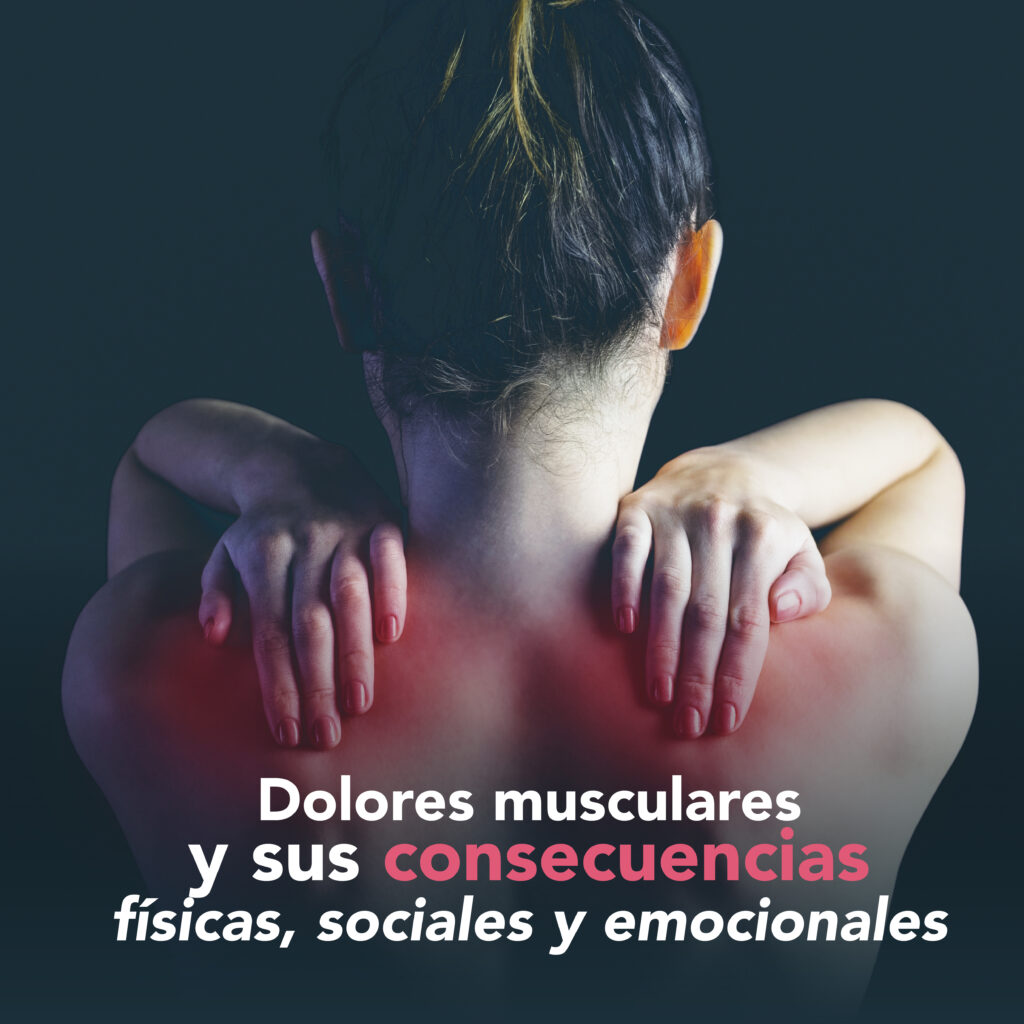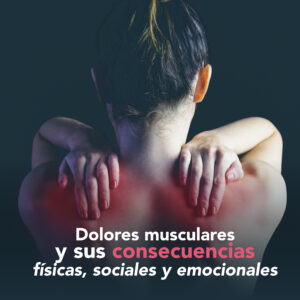
Have you stopped to think about the variety of negative effects, both physical, social and emotional, that muscle pain generates?
Obviously, muscle pain represents significant physical discomfort, since it can make it difficult to carry out daily activities, such as walking, lifting objects or even moving normally. This can affect quality of life and even functional independence.
Muscle pain, known medically as myalgia, can arise for a wide variety of reasons, including physical stress, intense exercise, poor posture in our daily lives, tension, depressive states, unhealthy seating, inappropriate footwear, injuries, or as symptoms. associated with specific diseases. Although in many cases muscle pain is temporary and can be relieved with adequate rest and care, in many cases it occurs in recurrent episodes and has significant negative effects on our quality of life.
Reduced Mobility and Flexibility
Muscle pain can limit your range of motion, making it difficult to perform daily activities. Stiffness and pain can restrict flexibility and agility, making tasks that require precise movements or physical effort more complicated.
Impact on Sleep Quality
Pain can significantly interfere with the ability to fall asleep or stay restful all night, leading to a cycle of fatigue and more pain, as lack of sleep can aggravate it.
Decreased Physical Performance
Muscle pain can affect a person's ability to participate in physical activities, whether in the context of routine exercise, sports, or simply everyday tasks. This can lead to a reduction in overall fitness and affect health and well-being.
Psychological and Emotional Effects
Continued pain management can have a negative impact on a person's emotional and psychological state, leading to feelings of frustration, anxiety, and depression. Decreased ability to participate in enjoyable activities or perform daily tasks can affect self-esteem and perceived quality of life.
Risk of Medication Dependence
To manage pain, some people may become dependent on pain relievers, which can lead to long-term health problems, including medication side effects and, in some cases, substance dependence or abuse.
Complications in Treatment of the Underlying Cause
If muscle pain is a symptom of an underlying medical condition, such as fibromyalgia, infections, or autoimmune diseases, failing to adequately treat the pain can complicate the management and treatment of the underlying disease.
It is important to properly address muscle pain, identifying its causes and applying the correct treatment. Strategies may include rest, using natural cosmetics that relax and oxygenate the muscles, attending physiotherapy sessions with a therapist who analyzes our causes and helps us avoid recurrent episodes, appropriate medication prescribed by a specialist, and in in some cases, lifestyle changes to prevent future incidences. In case of persistent or severe pain, it is always advisable to consult health professionals for proper diagnosis and treatment.
As muscle pain usually interferes with sleep at night or causes us to have unrefreshing sleep. This can lead to a feeling of constant tiredness and negatively affect mood and cognition, or mental acuity, during the day, therefore we must observe how these daily pains affect us and act on them before they manifest in a phase acute.
And of course, as we have already said, since it has a very significant effect on our emotional state, it can cause irritability, anxiety, depression and stress. Frustration over not being able to carry out normal activities can also contribute to feeling very bad and in these cases it affects our personal relationships, since it can make it difficult to participate in social and family activities. Additionally, constant discomfort can affect a person's mood and patience, which could influence their interactions with others.
Muscle pain is an issue that we have experienced many times, we have considered them a normal part of life and we do not always have routines that help us avoid them.
Carrying out weekly wellness sessions is a great preventive strategy, not only to avoid acute episodes, but because they balance our mind and beautify our body and soul. Receiving relaxing massages, mud baths or medicinal soils, using healthy body cosmetics and having periodic and preventive check-ups with our physiotherapist are very healthy strategies that will help us enjoy life and our body more, avoiding as much as possible the existence of those recurring pains.
There are a wide variety of treatments for muscle pain investigated in clinical studies, including cosmetics with anti-inflammatory and muscle relaxing effects, physical therapy, alternative therapies (such as acupuncture and massage), and lifestyle changes (moderate exercise, stretching, and adequate rest).
Our attention should also be focused on the prevention of muscle soreness, especially in sports and work contexts, through education on proper warm-up and cool-down techniques, ergonomics, and the importance of muscle recovery.
One of the recent clinical studies on muscle pain has focused on fibromyalgia, a condition characterized by chronic muscle pain. This study, supported by the US National Institutes of Health (NIH), has investigated various strategies to improve the treatment, diagnosis and management of pain in patients with fibromyalgia.
Significant efforts have been made in developing better diagnostic tests, including blood tests that detect molecular patterns characteristic of fibromyalgia and progress toward genetic testing, given the complex nature of this condition involving a combination of genetic factors. Additionally, the study has explored non-medicinal treatments, such as the practice of tai chi, which was shown to be as effective or even more effective than intense aerobic exercise in relieving fibromyalgia symptoms. The use of transcutaneous electrical neurostimulation (TENS) to facilitate movement and relieve pain has also been investigated (NIH MedlinePlus Magazine).

Every day there are more clinical studies related to pain. These studies illustrate the importance of multidisciplinary approaches in the management of complex conditions such as fibromyalgia, including both medical and non-medical treatments, to improve patients' quality of life. Among non-medical treatments, the world of general well-being is becoming more important every day, as are methods to reduce daily stress.
Many body aesthetic sessions and the proper use of natural body cosmetics not only improve appearance, but can also offer therapeutic benefits, including reducing the perception of pain, through improving circulation, stimulating cellular regeneration and relief of muscle tension. It is always recommended that these treatments be performed by trained professionals to ensure their effectiveness and safety, as well as the recommendation of specific cosmetics, depending on the case.
And of course, if someone is experiencing chronic or severe muscle pain, it is advisable that they seek medical attention for a proper diagnosis and treatment plan.






